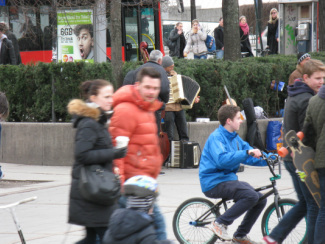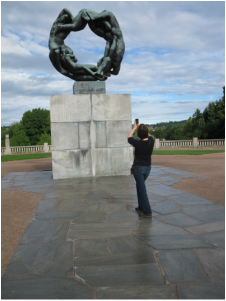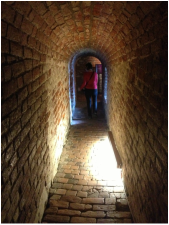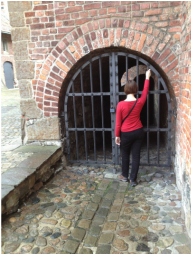Sacred Chickens
Menu
SACRED CHICKENS
|
Growing up in the South, as an evangelical, my entire life was informed by stories from the Bible; it couldn’t be helped. Narratively speaking, if narratively is a word, those stories were the in the very air I breathed. They formed the background of my life so that all my thoughts about ethics, morality, and even culture were influenced by them. One thing that was continually reinforced by these stories was the idea that the world was full of sinners and saints.*
While it now seems to me that Christianity began as a decidedly counter-cultural revolution, a solid defiance against doing things the way they have always been done, a cry for the oppressed (mostly labeled as "sinners" by society and often themselves) against the self-satisfied, the rich and the religious, often self-labeled as the "saints". And the thing was, as I grew up with those stories, I simply assumed that they supported the status quo. Those of us who were happy and living good lives were the "saints" and others were the "sinners." (There is nothing wrong with having a happy and stable family life by the way...which I did to an extraordinary extent. The problem comes in when contentment and stability are seen as signs that God is blessing you and conferring sainthood upon you.) At any rate, for those of in the sinner versus saint business, Jesus wasn’t the guy who came and said, “Hey! You’re doing it wrong! Come with me and we will change everything. This whole thing (including you, unfortunately) is broken. Let’s fix it!” Instead, Jesus was the guy who said, “You are really lucky! You ended up believing the right stuff and your world is comfortable because of it.The rest of the world would be comfortable too, if only they were just like you.” This is not to say that I didn’t know some incredibly sweet, religious people, people who were kind and wanted to help others. But on the whole, the stories I heard were almost never used to criticize “things as they are,” merely to reassure us that we were okay now and to try to herd others into our safe little box. We liked to rub off the edges off those stories to fit them in the box of comfort and social stability. Or maybe it was just me. I could have misinterpreted a lot of that stuff, being of a rather contented and self-satisfied nature. But that’s how it felt to me growing up with those Bible stories. Believing them should lead to contentment and happiness, white houses with picket fences, happy children and societal order. Convincing “sinners,” by which we often meant people who didn’t attend church or worship as we did, that they should believe as we did was for their own good. Most people believed in the practicality and common sense of religion as much as they believed in its goodness. A saint was a sensible person who knew what not to do and who not to hang around with and where to be on a Sunday morning. But sometimes, I manage to wake up just for a moment and realize that it is possible that my self-satisfaction and contentment with the “way things are,” may have contaminated my understanding of the Biblical stories of my childhood. For just a second I rouse myself and realize that these stories (about a man who was so annoyingly unacceptable to society and the status quo that society just decided to kill him and have done with it) should be changing my understanding of the culture and my place in it, not propping up all the things that make me feel comfortable. Sometimes I look at one of these childhood stories and realize maybe I never quite understood it. There is a story of Jesus, in Luke Chapter 7, verses 36 – 50 of a woman who comes to him while he is dining at the house of a Pharisee. I probably heard that story a million times when I was a kid. The woman washes his feet with her hair and her tears and then takes expensive perfumed ointment and pours it on his feet. Simon, the Pharisee, a member of a religious sect that was notable for its strict observances of religious law and tradition, questioned Jesus about this act, noting that the woman was a sinner. He felt that Jesus should be appalled at her touch, that her sins, whatever they were, might taint Jesus himself. (And he felt that if Jesus was a prophet he should know what kind of sinner the woman was). Jesus responded to Simon’s disgust in his typical nonlinear way by telling Simon a parable about a moneylender who forgave the debts of two men. One owed him 500 denarii and the other owed him fifty. Jesus asks which man will love the moneylender more. Simon replies that he supposes it will be the one who had the larger debt cancelled. Jesus then gives Simon a hard time for performing none of the customary acts of hospitality for him when he arrived, like washing his feet, unlike the sinful woman. Jesus then compares the woman to the debtor who owed the 500 denarii. He tells Simon that her loving acts reflect her joy at forgiveness and that her faith has allowed her to be forgiven. The end of the story and its moral do not reflect quite so well on Simon, although we are not told how he responds. (I picture a slight eye roll and a sigh of exasperation.) What is most interesting to me, having been brought up in an Evangelical milieu, both in my home church and in the larger culture surrounding it (I grew up in the town that headquartered the Church of God and the Church of God of Prophecy), is the idea that bubbles below the surface of this story for us good “church-going” people, the "saints". I have never heard anyone talk about it, although surely someone has, but there in the story itself is an out for the saints. We don’t have to feel quite so needy, quite so forgiven as the sinful woman. It’s an out that we Evangelicals take all the time. When Jesus says to the Pharisee, Simon, that he who has been forgiven little, loves little, I believe that somewhere at the depths of our souls we sigh with relief. The woman, possibly a prostitute, but certainly considered a sinner by the surrounding culture actually needed more forgiveness than the religiously observant Pharisee. Please follow me here. We think, we really think that someone less “religious”, someone who commits sins that were probably sexual in nature, needs more forgiveness than those of us rule-following church going good people. We are inclined to breathe a little sigh of relief. We play by the rules. We will pay our 50 and congratulate ourselves for knowing how much to borrow in the first place. How very sensible and saint-like! But Jesus never tells Simon that he needs less forgiveness. He merely notes that people who have been forgiven less, love less. I don't know if Simon necessarily sees himself in this scenario at all but if he does, he would certainly have believed that he was the man who owed 50 denarii. He was a better person than that "sinner." He definitely owed less. Here is what I am going to tell you….that’s utter and total BS. Who is the lucky person in this scenario? The woman who wants to change her life, the woman who wants to be filled with the kind of love that Jesus had somehow shown her. The woman who understands that like all humans she is broken, that she doesn’t treat herself or others in the right way. The woman who wants to be better and express love and gratitude. The woman who has decided to do something, even if it’s still something the pious won’t approve. Simon is the one who simply doesn’t understand. And if Simon thinks that his religious lifestyle was somehow preventing him from requiring more forgiveness then he apparently wasn’t listening to all of the other things Jesus had to say. Because, Jesus didn’t preach very often, if at all, about deviant lifestyles or swearing or any of those things. He didn't have a list of words to avoid using. Jesus’ main target was, in fact, the religious people and the rich people who thought they were the best kind of people. The people who thought they didn’t need to change because they were just fine. The people who would love their neighbors when their neighbors got a clue and stepped up to follow the rules. Here's what I think about "sainthood." If you think for one minute that you know what you are doing…if you think you have this being human thing handled…if you think following a few rules about things you shouldn’t do is an adequate expression of love towards your fellow human beings and you will love them when they start doing the little things you require (in love for them, of course, it would be wrong to hang with them until they meet the standards) and that lets you off the hook and makes you a decent person…then you are missing the boat completely and don’t even know that you are drowning. The older I get, and the more I screw up and flounder and struggle back to the surface, the more I know that there is one thing that makes a passable human being and that’s acknowledging that you’re broken. Yes you. You are screwed up, broken…a sad case, just like me and everyone else you know. You are no better than anybody else and you have no idea what circumstances might turn you into the exact same kind of loser as the people you see around you. If you think you’ve got things figured out…congratulations…you are far more likely to oppress others, annoy others, and generally be incapable of fixing the things that are wrong with you. Put it on your application for dictator. They love that stuff at the dictator employment office. Whatever sins the woman in the story had committed (and we don’t really know), what we do know is that she was capable of seeing herself as broken. She was capable of wanting to change…not the people around her…not “those people” who are ruining society and bringing God's wrath on the rest of us…she knew that the microcosm of evil and horror and war and nastiness was in herself. This is not to say that she would not henceforth care about justice and goodness and how other people were being treated. If you needed help, who would you go to, the sinful woman or Simon? The woman was far more likely to be among people who needed her help; people who were capable of acknowledging that they needed help. Simon’s very "sainthood" was the thing that prevented him from having compassion for others; his satisfaction with his religious observation prevented him from doing any of the kind of things that Jesus required. It prevented him from hanging around people who were dirty or who cursed or who were sick or poor…some of whom might have taught him a thing or two. It prevented him from taking his part in making the world a better place. It prevented him from seeing that even in his most compassionate moments, maybe even when he gave alms to the poor, he was full of self-righteous crap. The key here is that Simon thought there were two categories of people, sinners and saints. I think maybe that's one category too many. *I realize that I am using sinners/saints in an atypical way. I believe that the way I am using them is fairly well defined in the post.
4 Comments
The Totally Biased Guide To Visiting Norway By Someone Who Has Only Been There A Total Of Two Weeks9/12/2014 Part One: What to Be Afraid of in Norway Everyone knows that the first thing to figure out about FOREIGN places is what to be AFRAID of. So I am here to help you figure out what an American should fear in Norway. Norwegians have begun to complain about crime in recent years. But if you are afraid of crime in Norway, just go read the crime stats. (For instance Norway’s murder rate is .6 compared to the US rate of 5 per 100,000 people each year. Heck, in Norway apparently you can’t even completely kill a person in a year. You have to do the other .4 the following year.) The majority of Norwegians feel safe walking alone at night, almost 70% of them. Not so with US citizens, where only around 40% of people feel safe walking alone at night, which means that 40% of people in the US are crazy and that doesn’t make me feel any better. * Here’s my advice about fearing crime in Norway. Don’t worry about the crime. You’re from the US. They should be afraid of YOU. Comparatively speaking you are suddenly a lot safer in Norway than you are at home and they are probably less safe every time an American visits the place. I mean some of us have to be committing those murders here at home. Statistically speaking, just stay away from Americans while you are there. So am I saying Norway is a completely safe place to visit? No. There are some things you should fear. The Two Wheeled Menace– People in Norway are generally polite. They don’t push you out of the way or grunt at you in disgust if you hesitate like people in New York might. They don’t mind if you smile at them like Chicagoans might. They probably won’t run you over with their cars if you attempt to cross in the cross walk like Memphians. But put one of them on a bicycle and you better get the heck out of the way. Stop lights, Stop Signs, Stopped Pedestrians, Traffic. None of these matter to Norwegians on Wheels. THEY WILL RUN YOU OVER. Although they are quite polite and gentle about it. They want you to enjoy those last few seconds before they hit you without fear. I think I only heard one cyclist say “on your left” while I was there and only one had a bell. Trolls – Trolls will eat you (although according to the movie “Troll Hunters” they don’t eat atheists…I don’t know why. Something about the flavor I guess. Agnostics, I just don't know if you're safe but I wouldn't want to test it.) Did I actually see a troll? Well…not exactly but there are plenty of tunnels and caves that have every appearance of being totally rampant with trolls. I’m pretty sure lots of Norwegians get eaten by trolls every year. The population density is pretty low. (They rank 188th on the charts.) My own take is that this is likely due to trolls. Uneven surfaces and thresholds - Door thresholds are the real menace. They are all uneven. Every once in a while there is an even threshold in Norway. These few flat thresholds are only made level to fool foreigners into assuming they might pass through other doorways without looking down. They are simply there to help keep you off guard. Don't fall for it. The next doorway you walk through is probably an ankle biter. And not only are thresholds uneven, all walking surfaces are a little tipsy. We were in one department store which appeared to have been designed by M.C. Escher. The stairs started off as rectangles with regularly spaced treads and then slowly morphed into triangles that get closer and closer to each other with lower and lower treads. Once you manage to get off the stairs without injury, if you are that lucky, you notice that the floor itself forms a bit of a trough. I can kind of forgive the crazy uneven cobblestones at the medieval castle. It's pretty dangerous. Obviously, attacking armies would be lying in the lane nursing sprained and broken ankles. Great defense system for a castle. But how often are modern department stores ransacked by invading armies? And outdoor spaces are the same way. Essie went down at the harbor. The concrete forms small troughs and she took a spill on the way to dinner. She is still in a knee brace. Somewhere, I feel there is a special video channel that shows nothing but pratfalls by foreigners visiting Norway. That’s pretty much the list of things you should be afraid of in Norway. Next time we can move on to things to enjoy in Norway. *Here’s where I got my crime statistics http://www.nationmaster.com/country-info/stats/Crime/Murder-rate Recently, I have been thinking about my several-year career as a high school teacher. Maybe it’s because I miss teaching a little bit and maybe it’s because I have a daughter in high school, but it’s been on my mind. Sometimes teaching high school makes you feel pretty good about yourself. Maybe once a semester you think, “Hey…I think that kid might have actually listened to me.” You get all puffed up with self admiration and then next day you find yourself wondering if there are any available jobs open in lion taming, or sewer cleaning, or human testing for plant toxicity or something. It’s a bit of a roller coaster. I think one of the main reasons that the job is so difficult is because it comes with so much responsibility. There are lives in the balance. Here, each day when you walk through the door, are kids who will either crash and burn or pull themselves together and find a way to make it through life. Responsibility and authority…a teacher is responsible for up to thirty kids at one time. We have to teach them what they need to know to pass tests and graduate and perform crowd control at the same time. (Once I had a class of about 25 kids, five of whom were in court ordered anger management classes. Interesting times. I could write my own literature. It would be a thriller.) At any rate, I actually loved the kids I taught, even some of the most obnoxious and difficult ones. Sometimes, especially the obnoxious and difficult ones. But it was not an easy job. It could occasionally be really scary. And I’ve been thinking even more about the authority and responsibility inherent in that job since the news came out of Ferguson. Why? I guess even though I was a teacher, not a police officer I can see some places where the two jobs deal with some of the same sort of crap.
Here’s one of the stories that’s come to mind (there are more…especially when you consider what some of the other teachers went through). When I taught high school, I can remember standing within three feet of a seventeen year old boy who was standing on a desk in front of me, fists clenched, screaming. Three feet, maybe four feet from me. The screaming seemed to be directed at me. It was within my first two weeks of school and I did not know this child at all, so it was difficult to know exactly how I had come to annoy him so quickly. Usually, it takes people I meet at least six to eight weeks before they decide they hate me enough to stand on furniture and swear at me. Anyway, this kid was suddenly standing on a chair, clenching his fists, clearly out of control, right in front of me. It was quite a surprise. Once I had come to accept the surreality of the situation, I managed to talk him off the desk and he was sent out of the room and into in-school suspension for maybe a week or so, after which he returned to my classroom. Strangely, we had an okay year after that. In fact, we learned a lot of ways to help him keep himself calm and he even volunteered to help me out when he could. I ended up liking him a lot better than I thought I was going to when he was standing in a chair in front of me, cursing at me. And here’s the thing, I might have been in real danger. The story did not have to end in the way that it did. He could have come off that desk and hit me, probably really hurt me if he wanted to…and I didn’t know him well enough to know whether he wanted to. I am not sure if he knew whether he wanted to hurt me. I was a 38 year old woman at the time. I am not a small woman, but I was no match for him. Plus he had lots of practice at that sort of thing since one of his hobbies was getting into fights on the weekend and I pursue less demanding activities like gardening (although you should see me wrestling locust trees out of the ground…but that’s another story). In spite of the obvious danger, in spite of the fact that I was in no way a match for him, I can’t imagine shooting him, even though he was threatening me. I was his teacher. I was responsible for him and for all the other students in the room. The whole thing was not about me or even my safety in that moment. It was about making the situation less violent and making sure that if he did hurt someone it was me and not any of the other kids. In fact, I didn’t want him to hurt himself. That was my job as an authority figure. To keep us all as safe as possible, even at risk to myself. There are a few things you should know. First, I am a coward. I don’t seek out situations where I might be hurt or injured or experience any kind of pain or inconvenience. Quite frankly, I am not a fan of pain or inconvenience. But it was my job as an authority figure to keep the well-being of every student I had in mind, even the ones standing on chairs screaming invectives. The second is that this situation was probably not the scariest thing that happened at that school and we had a security officer with a gun. He never shot anyone that I know of. Another thing that you should know is that this particular student was dealing with the abuse of his mother at home. He was really struggling with a lot of things beyond his control, and in our subsequent interactions it became clear that he really wanted to be in control of his actions and emotions but didn’t have a lot of examples to help him out. (I didn’t find out about any of his family issues until about mid year.) All of this is to say: what is the difference between my reaction and the reaction of the police when they shoot unarmed black teenagers? (And even if you think the facts of this case in Ferguson are not settled there are many, many, many more cases….far too many to explain away.) Are the police responsible for the safety of citizens whether or not those citizens are behaving appropriately all the time? Does even a perceived threat equal a death sentence? Every day unarmed teachers and security officers deal with threatening situations like this. One of my education teachers told us about being in a situation where a security officer managed to take a gun from an armed student without shooting him at great risk to his own safety because he didn’t want to harm the student. (The Security Officer had a gun and used it to de-escalate the situation instead of killing the student). What is the difference between the reaction of those of us in schools and police officers on the street? Police officers typically have non lethal options for stopping people as well. Why do we see totally such totally different outcomes in educational and law enforcement settings? Surely, so many cases of being threatened by an unarmed teenager don’t have to be resolved with lethal force. Why in so many cases does it come down to that? There are obviously factors that result in very different outcomes for very similar levels of threat. My own take on it is that in schools, we see students as people, complicated and difficult but people. Humans with potential. The kid screaming on the chair can join the Army. The suicidal girl with bi-polar disorder is a really good artist. The guy in the back of the class who falls asleep on his desk is working in a garage at night to help his mother make ends meet. Joe may yell, “F*** you!” to Martha while you are reading The Scarlet Letter but he offers to come and mow your grass or get you some of his Mamaw’s moonshine (the brown is for colds and cough and the green one for arthritis…I don’t remember…I bet you would quit coughing and not be able to feel your legs with either one. If you ever run into Joe’s Mamaw she always has some by the way…keeps it under her shirt). The point is they were all people to me. Now, I know not all school systems or teachers teach with that understanding of authority, but it's much more prevalent than in other instances where one group of people is responsible for another. I think at it's best teaching like parenting is an instance in which whatever power you might briefly hold over another person is meant to be in that person's best interest. Control is held lightly and only to enable the other person to achieve certain goals. The goal of law enforcement, it seems to me is to ensure that everyone can live in a community free of fear and to remove those who cannot cooperate for the good of others and...yes...even themselves. When you cross a line and the people under your authority become mere threats...all of them....then I think the outcomes will be that law enforcement causes the very fear and chaos it seeks to prevent. When you see someone and immediately assume that the person is a problem or worse yet a “thug” then hope for humane authority and responsibility is lost. Authority carries a great deal of responsibility for the people you have power over. It might even require you to give them the benefit of the doubt that they are human, just like you. It might also require that your main goal in interactions is not simply to remain safe. Ask a teacher. Sometimes patterns of authority can become entrenched; systems seem foundational. But that is no excuse not to rethink them when they become oppressive. ****I would like to note that I personally know some very nice police officers and I am not condemning all police officers. |

Click Photo above to buy ebook or paperback from Amazon.
Here's the link to Barnes and Noble Or order through your favorite independent bookstore! Categories
All
|










 RSS Feed
RSS Feed